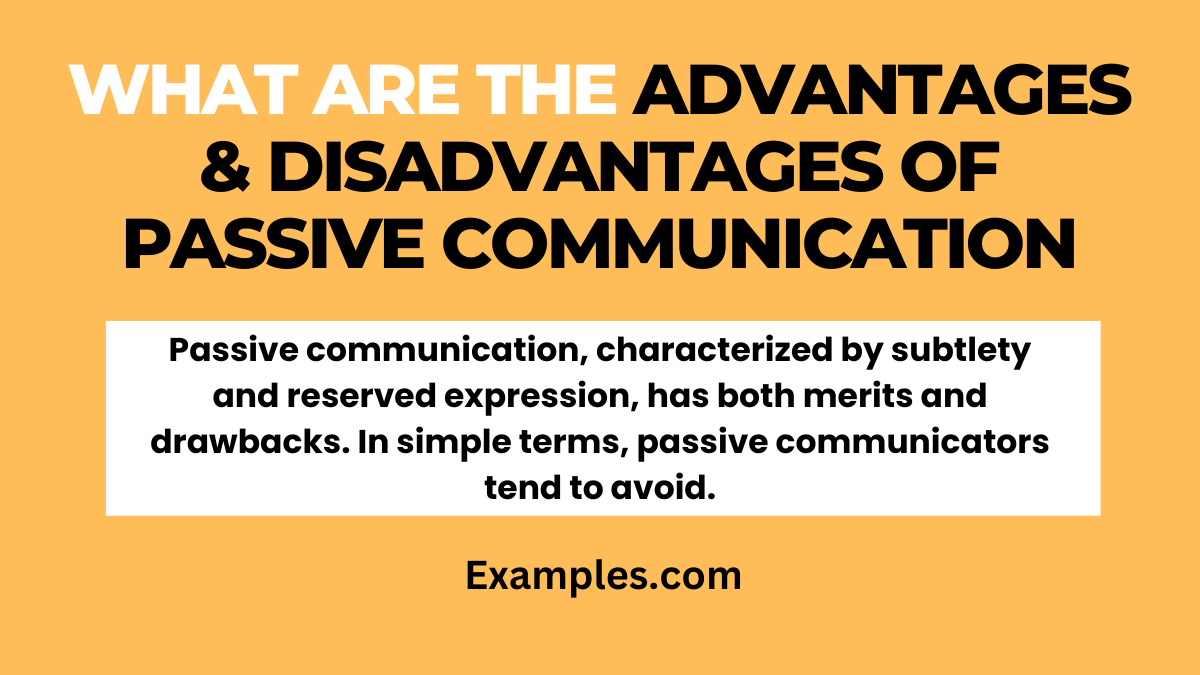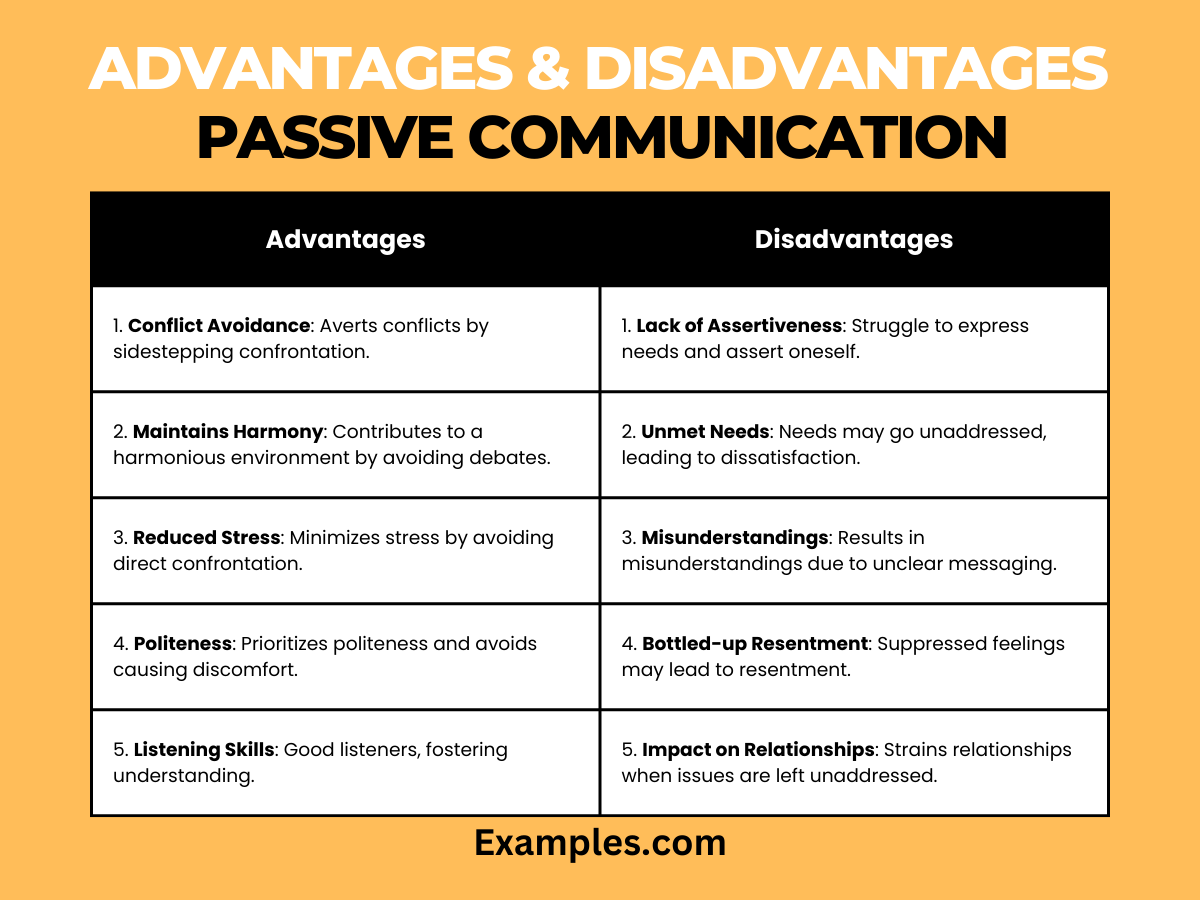Advantages & Disadvantages of Passive Communication Examples
Unlock the intricate dynamics of communication with our comprehensive guide on the advantages and disadvantages of passive communication. Delve into real-world scenarios with communication examples that illuminate the subtleties. From nonverbal cues to interpersonal finesse, this complete guide empowers you with insights and strategies. Elevate your communication skills, navigate workplace scenarios, and grasp the essence of passive communication for more effective interactions. Explore the nuanced world of communication with this illuminating guide.
What are the Advantages & Disadvantages of Passive Communication

Passive communication, characterized by subtlety and reserved expression, has both merits and drawbacks. In simple terms, passive communicators tend to avoid confrontation but may struggle to assert their needs. Explore the clarity of passive communication, understanding how it shapes interactions positively and the potential pitfalls to navigate. This unravels the essence of passive communication, offering a straightforward understanding of its advantages and disadvantages.
Advantages and Disadvantages of passive communication

| Advantages | Disadvantages |
|---|---|
| 1. Conflict Avoidance: Passive communication often averts conflicts by sidestepping confrontation. | 1. Lack of Assertiveness: Passive communicators may struggle to express their needs and assert themselves. |
| 2. Maintains Harmony: It contributes to a harmonious environment by avoiding heated debates. | 2. Unmet Needs: Needs may go unaddressed, leading to unfulfilled personal or professional requirements. |
| 3. Reduced Stress: The absence of direct confrontation can minimize stress and tension. | 3. Misunderstandings: Passive communication can result in misunderstandings due to unclear messaging. |
| 4. Politeness: Passive communicators often prioritize politeness and avoid causing discomfort. | 4. Bottled-up Resentment: Suppressed feelings may lead to resentment over time. |
| 5. Listening Skills: Passive communicators tend to be good listeners, fostering understanding. | 5. Impact on Relationships: It can strain relationships when important issues are left unaddressed. |
| 6. Observant: Passive individuals are often observant and attuned to others’ emotions. | 6. Difficulty in Decision-Making: Passive communicators may struggle to make decisions assertively. |
| 7. Prevents Escalation: By avoiding confrontations, passive communication prevents issues from escalating. | 7. Impact on Career: In the workplace, passivity might hinder career growth and opportunities. |
| 8. Promotes Harmony: Passive communicators contribute to a harmonious team or social setting. | 8. Self-Esteem Issues: Continuous passivity may affect one’s self-esteem and confidence. |
| 9. Calm Demeanour: Passive individuals often maintain a calm and composed demeanour. | 9. Overdependence on Others: There can be a tendency to rely excessively on others’ decisions. |
| 10. Empathy: Passive communicators often display empathy towards others’ perspectives. | 10. Difficulty in Expressing Feelings: Expressing personal feelings may be a challenge for passive individuals. |
Advantages & Disadvantages of Passive Communication in Essay
Passive communication, though subtle, comes with its own set of advantages and disadvantages. Understanding these nuances is crucial for effective interpersonal dynamics. Let’s explore the distinct aspects of passive communication in depth.
Advantages of Passive Communication:
- Conflict Avoidance:
- Passive communication mitigates conflicts by avoiding direct confrontation, fostering a harmonious environment.
- Maintaining Harmony:
- It contributes to overall harmony by sidestepping potential disputes, creating a positive atmosphere.
- Reduced Stress:
- The absence of confrontations minimizes stress levels, promoting a more relaxed and comfortable environment.
- Politeness and Tact:
- Passive communicators prioritize politeness, navigating conversations with tact and diplomacy.
- Effective Listening Skills:
- Passive individuals often excel in active listening, enhancing understanding and empathy in conversations.
- Observational Skills:
- Passive communicators are observant, attuned to nonverbal cues, and adept at interpreting unspoken messages.
- Prevents Escalation:
- By avoiding confrontations, passive communication prevents issues from escalating into larger conflicts.
- Promoting Team Harmony:
- In a team setting, passive communication can contribute to a positive group dynamic and a cooperative atmosphere.
- Calm Demeanour:
- Passive communicators maintain a calm demeanour, even in challenging or high-stakes situations.
- Empathy in Communication:
- Passive communicators often display empathy, understanding others’ perspectives and emotions.
Disadvantages of Passive Communication:
- Lack of Assertiveness:
- Passive communicators may struggle to express their needs and opinions assertively.
- Unmet Needs:
- Critical needs may go unaddressed, leading to dissatisfaction and unfulfilled expectations.
- Misunderstandings:
- The subtlety of passive communication can result in misunderstandings due to unclear messaging.
- Bottled-up Resentment:
- Suppressed feelings and unexpressed concerns may lead to long-term resentment.
- Impact on Relationships:
- Passivity can strain relationships when important issues are not openly discussed.
- Difficulty in Decision-Making:
- Passive communicators may find it challenging to make decisions assertively.
- Career Implications:
- In professional settings, excessive passivity can hinder career growth and opportunities.
- Self-Esteem Issues:
- Continuous passivity may impact one’s self-esteem and confidence.
- Overdependence on Others:
- Passive individuals may rely excessively on others’ decisions, lacking independence.
- Difficulty in Expressing Feelings:
- Expressing personal feelings openly may be a significant challenge for passive communicators.
Advantages & Disadvantages of Being Passive in the Workplace
| Advantages | Disadvantages |
|---|---|
| 1. Conflict Mitigation: Passive behaviour can prevent workplace conflicts, maintaining a positive environment. | 1. Limited Career Advancement: Overly passive individuals may miss opportunities for career growth. |
| 2. Enhanced Team Dynamics: Promotes harmony in team settings, fostering collaborative relationships. | 2. Difficulty Expressing Ideas: Passivity may hinder the expression of innovative thoughts and ideas. |
| 3. Stress Reduction: Avoiding confrontations minimizes stress, contributing to a healthier work atmosphere. | 3. Unmet Professional Needs: Passivity may lead to unaddressed professional needs or aspirations. |
| 4. Improved Listening Skills: Passive individuals tend to be attentive listeners, aiding effective communication. | 4. Impact on Decision-Making: May struggle to assert opinions, influencing decision-making negatively. |
| 5. Positive Team Culture: Contributes to a positive team culture by preventing unnecessary conflicts. | 5. Ineffective Problem Solving: Difficulty in addressing issues directly may impede problem-solving. |
| 6. Conflict Prevention: Proactively addresses conflicts at an early stage, preventing escalation within the team. | 6. Increased Workload: Colleagues may perceive passivity as a lack of initiative, leading to increased workload. |
| 7. Cordial Interactions: Encourages politeness, creating a cordial work environment that reduces workplace tension. | 7. Risk of Exploitation: Overly passive individuals may be at risk of exploitation by more assertive colleagues. |
| 8. Effective Delegation: Passive individuals may excel in tasks requiring careful attention and adherence to instructions. | 8. Impact on Leadership: Challenges in taking on leadership roles due to a preference for passive behaviour. |
| 9. Conflict Resolution Skills: Passive individuals often excel in defusing conflicts with a calm and composed demeanour. | 9. Difficulty Setting Boundaries: May struggle to establish and maintain professional boundaries. |
| 10. Promotes Team Unity: Supports team unity by avoiding unnecessary disruptions and maintaining a focused work environment. | 10. Missed Growth Opportunities: Passivity may lead to missing out on professional development opportunities. |
In conclusion, exploring the nuances of passive communication provides valuable insights into its advantages and disadvantages. With practical examples and comprehensive guidance, this complete guide equips individuals to navigate the complexities of this communication style. Balancing subtlety with assertiveness, readers gain a deeper understanding, enhancing their interpersonal skills for effective and meaningful interactions.



